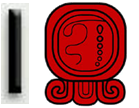Born 5-Noj: Byron Katie, Fernando Torres, (The Cure’s) Robert Smith, Demi Moore, Michael J. Fox, Nikos Kazantzakis, (Astronaut) Michael Collins, Elliot Gould, Gilda Radner

“Jimi Hendrix changed my life. Each generation influences the following one and as a consequence brings it back to the past.” – Robert Smith (5-Caban) venerating Hendrix (9-Lamat, previous trecena)
As a father, I watch my young children and reflect on my own upbringing and younger years. How it was back then compared to our current confusing era, in sync and in step with each passing year.
The differences are numerous and vast. But one in particular is closely related to today’s nawal: Noj.
It was fairly early in my earthly tenure, when I first learned from my teachers to assign to my own intuition its proper, benign role in life. I was born into a secular, irreligious society that has long since relegated intuition to something you should either keep to myself, or share only with those who care to listen.
Some walks of life in My West still found this basic human ability useful and worthwhile, like detective work, music and art in general, the priesthood, and animal care-taking. But somehow, somewhere along the road, intuition got a bad rap, and was henceforth seldom picked for the team.
The ones that were picked for the team were not considered peripheral by any parameter. They were Logic, Organization, Analysis, Precision, and Division (captain).
This meant that, if I wished to be successful, I had to be good in math, to think, ponder, consider, and analyse as much as possible, to make sound, explainable decisions, based on unbiased observation, and to categorically leave intuition out of serious matters.
For me personally, I know today that this conditioning proved debilitating. In many ways, I’m still reeling from it. Its voice often speaks louder than my better, more delicate judgments. But now it is exposed and more easily spotted. I’ve slowly and meticulously exercised my intuition back into shape. I’m out of rehab, every day increasing my trust in this priceless birthright appendage of mine.
And I use every chance to show my children how never to lose it in the first place.
Brains vs. Brawn
Nawal Noj is related to divination. According to Ken Johnson, on Noj days people traditionally went to seek advise from their community day-keepers and divination practitioners. Noj is also associated with thought and (like its year-bearer counterpart Iq) good ideas.
Obviously, to practice these arts one must trust their intuition, and customize their readings to each visitor on the spot. They live their days learning about people, relationships, and the world.
On the flip side, Noj types (especially men) are notorious for having a cerebral bias. Very few of them have patience for spiritual stuff like astrology, hunches, and anything insubstantial.
Somehow, where I find division on one level, the Tzolkin abides in harmony on another level.
The mind as master constantly plays tricks on me. Showing me certainty where more questions beg. Proving repeatability in the midst of quantum chaos. Talking and debating where silence and a hug are wiser.
The mind as friend is an altogether different story.

